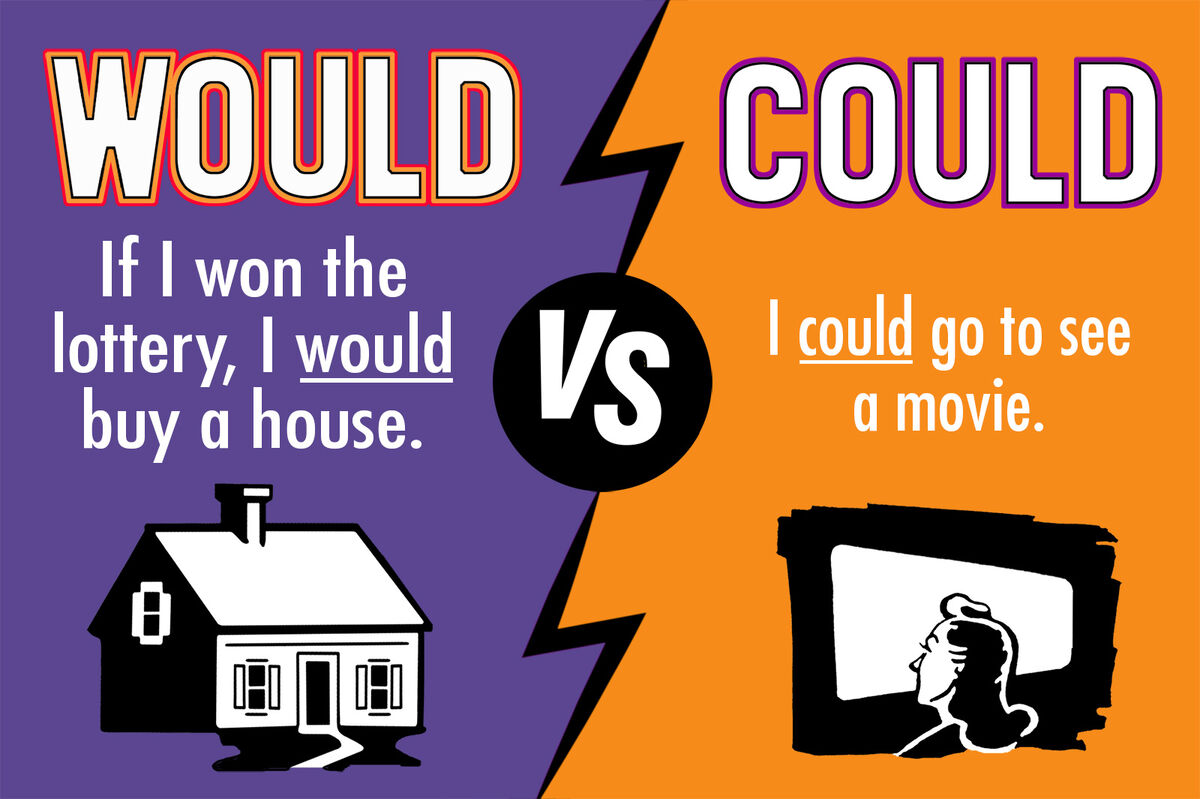
Should you use “would” or “could" in your sentence? Not only is it a tongue twister, but it’s also confusing to figure out the difference. Don’t let your confusion of "would" vs. "could" lead to an embarrassing grammar mistake. Instead, follow these simple rules that are illustrated with example sentences.
“Would” vs. “Could:” The Difference
Both “would” and “could” are modal auxiliary verbs, which are better known as a form of helping verbs. Helping verbs have a great name, because they help the main verb in the sentence. Now that you know what they are, you can break down their respective meanings.
- Would: Past tense of will; expresses something happening in the past or in an imaginary or hypothetical situation
- Could: Past tense of can; shows the potential or ability of something happening
While they're clearly different, their usage in a sentence isn't always as clear. Find out which word to choose and when.
The Possibility of Using “Would” and “Could”
When it comes to ability and hypothetical situations, “would” and “could” are used slightly differently. Follow these quick and easy guidelines to never get confused again.
“Could” to Show Ability or Possibility
“Could” shows the ability to do something in the past or future. For example:
When I was younger, I could ride my bike home in 10 minutes.
In other words, you had the ability to ride your bike home in 10 minutes, but that doesn’t mean it was necessarily done in 10 minutes. It just means that you had the ability to do it in 10 minutes.
Still confused? Seeing a few more examples in action can really drive this point home.
- I could go to see a movie.
- Danny could sleep in the car on the way home.
- Joanne could get a raise in that new company.
- You could go out with your friends if you finish your homework.
- Melissa could get that new job she’s been eyeing.
“Could” shows how something is a possible but not definite.
“Would” to Show Certainty
While “could” shows ability or possibility, “would” shows certainty in a past or hypothetical situation. If you think about “would” being the past tense of “will,” then it completely makes sense. For example:
When I was younger, I would ride my bike home in 10 minutes.
Not only did you have the ability to ride your bike home in 10 minutes, but you did do it in 10 minutes. “Would” doesn’t leave any question or possibility.
Get a clearer understanding of this difference by looking at a few more example sentences.
- If I won the lottery, I would buy a house.
- Danny would sleep in the car on the way home.
- I would help you this weekend, but I'm working.
- If the company changes, you would get a raise.
- If we go on vacation, it would be somewhere hot.
“Would” and “could” can also be used together to show certainty and possibility like:
I would go on vacation if I could get the time off.
In other words, "I will definitely go on vacation if it is possible to get the time off."
Simple Memory Trick
If you ever have trouble deciding on “would” or “could,” remember where they come from.
- Could: I can do it. (possibility)
- Would: I will do it. (definite)
Now, take a look at the difference between "would" and "could" in polite expressions.
Polite Expressions Using “Would” vs. “Could”
When it comes to polite expressions, like making a request or asking permission, “could” and “would” can be used pretty interchangeably. For example, you could say:
- Could I have an eraser?
- Would you give me an eraser?
However, there are a few instances of polite expression where you only use “would” or “could.” Learn why.
Use “Could” for Making a Suggestion
When you are making a suggestion, you are offering a possibility. It is in no way definite. So, you will use "could" for suggestions.
- You could take Broadway.
- We could go to the movies.
- I could take that home and fix it.
- You could go on the bus.
- That idea could work.
As you can see, you are offering a possibility. If you were to put “would” into one of those same sentences, it turns it into a command rather than a suggestion. For example, “You would take Broadway.” As you can see, the choice is gone from the sentence, so it is no longer a suggestion.
Use “Would” for Offers and Invitations
Invitations should be definite. You don’t want to leave any question that you are offering or inviting someone. These expressions will use “would.”
- Would you like to come over?
- I would like to go to Barbados.
- Would you like to go on vacation with me?
- I would like to invite you to our wedding.
- Would you like to have tea?
The clue to the fact that this is an offer or invitation is the inclusion of the word “like.” Similar terms would work in much the same way. For example, "I would love to go to Barbados."
Correctly Using “Would” and “Could”
Sometimes the difference between “would” and “could” isn’t so clear. However, by knowing the rules, you can really clear things up. You have a bit of knowledge about verbs, so maybe think about giving action verbs a try. They might just have you screaming in joy!